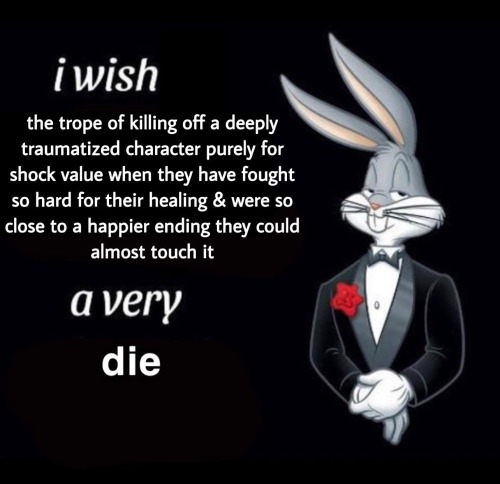Dive into a world of creativity!
Tropes - Blog Posts
I will always love the trope where the “edgy, emo kid“ is the most functional in the group/family.
The family is so dysfunctional that the emo kid has to be the adult most of the time.

cartoons were wacky for making us believe this trope
the wolf & the sheep? no. give me the wolf & the shepherd. the guide & the necessary evil. neither sets a trap for the other – both are trapped by the society they work for. the wolf appreciates the shepherd's fearlessness, the shepherd quietly relaxes into the wolf's independence. they're equals, they're aside from the rest and they're both dangerous
Some of my favorite tropes!
(just for the heck of it)
Character who starts out as an antagonist/villain and goes through a redemption arc
^ The above, but after they are redeemed, they still struggle to integrate in with 'the good guys' and have a long road of earning the trust of others
Homunculus/artificially created being who is misunderstood by others/longs to understand humanity
^ Especially when they are good but were created by someone evil
As an alternative take, a homunculus/artificially created being who was made by someone very good and struggles to live up to their creator's light
A very hard to get along with/seemingly jerk-y character who is actually extremely loving and sensitive deep down, and it shows around the people they trust
Siblings who are mirrors of the other (what they might be, could have been, and wish they were), who understand each other more deeply than anyone else but struggle to reconcile themselves to one another
Villains/antagonists who give the hero a terrible time but are actually really kind and considerate to their own associates (has a found family with all of their henchmen, has really good healthcare benefits and perks for their workers, is able to upkeep positive relationships and is actually respected)
The 'odd couple' trope tickles me so


My favorite trope will always be "X finds [insert incredibily dangerous species/thing/person/etc.] but has no idea it's dangerous. Everyone else is terrified and confused bc how is X still alive???"
What is a character's core?
I've used this term and variants of it in a few of my posts and I wanted to take a quick moment to define it because I'm not sure how commonly discussed this topic is, but it's an important one to keep in mind when evaluating and writing certain types of media.
Most genres of fiction make use of standard character roles/tropes. The plucky sidekick, the dastardly villain, the last girl, and so on. This isn't a bad thing. The existence of this stuff is a big part of how we define genres and how we evaluate writing quality. For example, if you're writing a romance, you're going to have romantic leads. Two (or more) individuals who will be together by the end of the story. If these roles don't exist, then you don't have a romance. And if their relationship feels toxic and unhealthy? You may not have a romance. Or, at least, not a classic romance. The worse the relationship is, the more you wander into the genre of "dark romance," which is all about enjoying deeply unhealthy fictional relationships.
This brings us to Miraculous and why I feel comfortable defending Adrien and Marinette as victims of bad writing.
Unless the writers are doing something truly insane, the love square is our end game couple. The ones destined for a happily ever after. That means that everything the writers do with these two and their relationship can be evaluated through the lens of, "are you honoring the characters' roles as the romantic leads?" And if the answer is, "No?" Then the writers are failing because "romantic lead" is a defining aspect of these characters. It isn't what they should be, it's what they are. Anything that goes against them being a good couple is bad writing.
This doesn't mean that they must be perfect. They're allowed to make mistakes and have flaws. Those are the sorts of things that drive a story! But the mistakes and flaws have to be treated as such by the narrative, they have to have some sort of resolution, and they have to be maintained in balance with the whole "love interest" thing. Too many mistakes and flaws and we've gone from "romance" to "tragedy," which is what I'd currently define Miraculous as.
This role evaluation thing isn't limited to romantic leads. Any character that has a clear role in the story can be evaluated via this criteria. For example, Alya is clearly meant to be a good best friend and reliable confidant for Marinette. You can tell this because of things like her learning Marinette's identity and her helping Marinette discover the secrets of the miraculous, big story moment that are treated as positives by the narrative. So anything Alya does that makes her feel like a bad friend is bad writing. It's why I get the Alya salt, but don't participate because I can't view her as the awful person the Lila stuff makes her out to be. That's not who Alya is narratively speaking.
Generally speaking, this core/role thing is my main way of evaluating characters in genre content like Miraculous. It's the driving force behind most of the character discussion on this blog and something I strongly encourage people to think about if they enjoy reading/writing genre content as it's a great guideline! Figure out the role a character is supposed to be in, generally honor that role, and you're golden! You have room for flaws and conflicts while still having something to keep you in check from straying too far off course.
